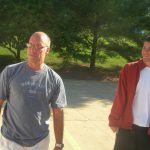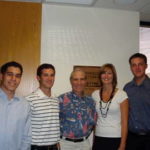Jesus Delgado-Jenkins, founder and president of JNI, LLC, knows something about hard work and commitment. As the son of Cuban immigrants who instilled a great deal of patriotism in their son, for his new country, Jesus attended West Point and served in the United States Army for five years. Entering the private sector, Jesus immediately began to excel in the world of business turnaround, where business are acquired and streamlined to reach their maximum potential. Jesus points to the mentors under which he was able to work as helping to shape him for his future, individual endeavors.
From 1999 through 2001, Jesus began to look carefully at his own opportunities, but never closed a single independent deal. This proved fortuitous when, after 9/11, Jesus felt obliged to serve his country. In two years at the United States Treasury, Jesus advanced to become the CFO of the Treasury, overseeing account volumes the likes of which most businessmen never see. He calls the numbers “humbling.” After two more years of public service, Jesus once again entered the private sector, this time with a better grasp of economics on a global scale.
Now, Jesus has taken JNI from a startup to a multi-million dollar company, completing his piece of the American dream: an immigrant family, whose son serves his country, then enters and dominates the business world. “If you work hard enough, and long enough,” Jesus says simply. “You will achieve your dream.”
INTERVIEW
So at 22, you were at West Point going into military service for five years?
Yep.
So you mentioned on the walk over here, you’ve had a variety of experiences. You also said that it’s been a stepping stone to where you’re at today.
They end up being stepping stones. I think at least for me personally, a very important part of my success has been I’ve felt I’ve had an obligation to succeed. My parents came to this country with nothing. They had escaped communism. Because the United States had let me and my family stay here, I felt this sense of obligation to succeed and eventually give something back. That’s part of my passion. I feel like I have an obligation to succeed.
So as I was growing up I felt obligated to get good grades. I think that’s important.
If you’re already at a later stage in life, grades are irrelevant. You got to pick up from where you are, and start driving yourself from there. Find it within yourself to drive on. The past doesn’t matter as much. You just have to look forward and drive on and succeed according to whatever success means to you.
For me it means being excellent at what you do. It means being competitive. Being in the top 5 at something. If you’re a company in the XYZ industry you’re a top 5 company or you’re in the top 5%. Customers like your product. They like your employees. That, for me, is success.
Along with that, I feel that as an executive, you will be more successful in the long run if you share the wealth with the employees. If you create career opportunities for the employees that allows them to evolve and engage, and you listen to what they have to say, and if you reward them with part of the benefits that the company generates, the profits the company generates, you will build a winning, progressive culture.
If the executives are in it for building their own wealth, they aren’t going to share it, they’re going to scoop up most of the stock compensation programs, it’s pump and dump. The company stock will rocket fairly quickly because you’re going to cut costs and you won’t reward employees long term. And the stock will bounce back down again, but that’s when the executives will have left.
If you try to build something long term, in terms of a company, which is what I define as success, that’s why I’m talking about a company and not myself. That’s what I’m trying to do now. My partner and I are buying companies with a focus on the retail industry. What drives our passion is that we build a winning, long lasting organization that has a legacy. And we believe that by doing that, we ourselves will benefit in the long run. And we won’t have to worry about that.
So that’s what we’re doing now.
So you went to one of the best leadership programs in the world. How does that shape you today? Do you still take away those things that you learned?
West Point had a dramatic impact on me as an individual. Both in terms of my physical stamina and my mental stamina. My ability to organize and analyze problems. Whether I know something about the subject, or not.
You’re really taught there, regardless of the environment, to find yourself and cope, adapt and learn quickly. To think through your decisions and consider the consequences. Take a wholistic approach to yourself and the individuals that are there in that environment that you’re operating with. And then find a way to survive and thrive and dominate the environment. That’s what they teach you.
The honor code is an important part of that. Integrity is important. When you lead by example, and you follow the standards you set for other people first, that makes a big difference in the organization. West Point teaches you the importance of that. Our honor code is that a cadet will not lie, steal, or cheat. The motto of the institution is ‘Duty to our country.’ If you think about those two, they don’t have anything to do with the individual, they have to do with the individual serving. Having a service ethic for others. You build a passion for that at the academy. And you go on to build on that as a military officer. Not for yourself, but for others.
You’re serving something bigger than yourself. That then builds a foundation for having a passion to succeed by making others successful, the organization successful. And thereby you succeed by doing that.
I think that type of philosophy, religion is another way you would look at it. Not just a spiritual religion, but a religion of leadership. I think the Academy was very important in giving me those things. I’m very grateful for that. That has been an extremely important component to me being successful because that’s where I started from.
I graduated from there and had a successful career in the military. I transitioned from there into the private sector and had success there. I was basically using the skills and the tools that I first learned there and continuously applying them.
The other thing too is I’ve had a bit of luck. I’ve been very fortunate in that for the most part, I’ve worked for very good leaders. I’ve learned from them. I’ve learned how to apply what I’ve learned at the academy by watching them do it. By watching them do those things in difficult situations. In situations where it’s a gray area, where it isn’t black and white, it’s confusing. And you’ve got to make tough decisions that have ramifications beyond just today.
Watching them use their judgment, taking all the facts at hand and making their decisions, I learned through that.
So you’ve had quite a few career changes.
I have.
If you go down the list you’ve had a lot of different industries. A lot of people, especially with our generation, we’re starting to not be so hesitant to do career changes. It’s no longer get a job and stay there for thirty years. It’s more bouncing around. I was wondering if you could talk a little bit about that. Because it seems like people aren’t as fearful any more to make career changes. I was wondering if there was any generational differences?
Generational differences. I think what you may find is that generations in part are known for what they’re known for based on the environment they grew up in and lived in. If you have an economy like the 50’s, 60’s, 70’s, where it’s a macro economy, you’ve got maybe two choices for Kraft macaroni and cheese. That’s it. There’s not a lot of change in that type of economy. You can only have so many colors for cars. There’s not that much of a change.
As we innovate and technology improved, and companies were able to give customers and address their needs more specifically, more uniquely, you’ve got all this change evolving. Now there’s five or ten different macoronis. You look at any brand, any family brand, you’ve got all these choices and varieties in that aisle.
Whereas in the past, you didn’t use to have that. Well that springs up a whole bunch of new industries and new needs and new companies that have to be in place to deliver on all those varieties and all those complexities. Information technology, marketing, advertising, distribution of advertising through a different medium. That spawns a whole new set of industries. Then what happens to the next generation is that they’re living in a very different environment than the previous generation.
Now you have all these different choices. Not only that, but look at all the resources you have to go get a job. Heck, you can just type a job description into Google. Whoof! Options and all this stuff pops up in front of you on a computer screen. You couldn’t do that in the sixties and seventies.
I think now there’s a lot more transparency in the market place. Individuals have a significantly different amount, or have a much higher set of resources that are cheap. What does it cost to type a job description and hit return on Google? What does it cost you? Nothing!
If you had to go find an executive recruiter in the 70’s or 80’s, you had to get in your car, take a half a day, put all your resumes together, drive somewhere for forty-minutes. You had to meet with the person for an hour. Drive back another forty-minutes. You had to pay for the gas. You had to do all that and spend half a day and then you really didn’t any information. All you did was deliver your resume. Now, it’s the complete reverse. You’re typing eight words, or five words into a computer, and you’re getting thousands of job listings.
So what’s happened with technology and information validity has dramactially opened up people’s options and the information people can review to generate and consider options. That obviously is going to create the opportunity for individuals, when they’re not happy in a company, or when they’re not happy in a career, they have choices to switch out.
In the past, it was much more static. It was a less flexible structure. You didn’t have choices. If you had a good job, and it was a good job that paid the mortgages, paid for the kid’s school, you were half stuck in that job. You had to wake up in the morning and find it within yourself to be passionate about that job. A lot of people can do that, a lot of people can’t.
Now there’s two sides to every coin. For all the benefits that you get by being able to switch when you can, there’s probably consequences to that. What those are I’m not as familiar with. But you know, maybe you don’t have companies now that take care of their employees as much. Because everyone is coming and going. It gets expensive when you do that, right?
Even though you have all these benefits, it’s never a free lunch. You know e=MC2. There’s always an answer in balance. You can’t get something for free. There’s going to be an offsetting balance. What you’re trying to do is make good choices based on what tradeoffs you’re willing to live with. For very few people it’s nirvana. For better or worse, maybe I’m wrong. So you have to decide for yourself, ‘What tradeoffs do I want to live with in order to find what I like to do? What are the costs I’m willing to incur in order to get those benefits?’ So those become individual choices.
What are some individual tradeoffs that you’ve taken in order to get to where you are today?
When I made my decisions, I try to make decisions that would give me flexibility in the future. Because I always felt that I wouldn’t always know what I’d want in the future. And as I changed as a person in the future. What I would want or what I would desire might change. So I try to pick careers and jobs that if I did them extremely well, I knew that in the future, I could opt into four or five or six different careers or job types within a career or within an industry.
You have different industries and different career paths. If I did early jobs in my career, I did them extremely well. And I had very good general skill sets that made me competitive and desirable as a person, an employee to an employer. I would have more choices and more freedom to have an impact on the outcome of my life. Have an outcome on what I ultimately wanted.
So when I chose to go to West Point, I knew it was a very good leadership school. It was a very academic, challenging environment. Both mentally and physically. I felt if I could survive that, that in most environments I’d probably be competitive.
Then I went in the military and I specifically picked an overseas assignment because I felt that if I had an overseas experience, again, it would be something unique to my resume that would separate me against the people I’d be competing with for future jobs that they may not have on their resume.
I was billingual, which again is another skill because I know Spanish, German and English. By going to Germany I’d learn a third language. And getting exposed to all these cultures and different ways of doing business. Of course, in the military I was stuck with contractors. I just thought it would be another enhancement to my resume and my background and my skill sets.
When I left the military, I felt the military was my big corporate experience. Like a General Electric or a Kellogg or a Exxon Mobil. I felt that I needed in my background a small company with entrepreneurial experience. So I specifically tried to pick to work for companies with no more than 250 employees. I want to look for that. Some kind of criteria that would force me to look for a small growing company.
I was just fortunate in that I got work that introduced me to those opportunities. It was tough at first. But finally I found a real estate acquisition construction company. They had a turnaround situation which I thought again was a good opportunity because now I had a turnaround opportunity, and entrepreneurial. Worked both of them.
So I accepted that job. It was supposed to be a two to three year assignment. Six months into the job I realized that I could do parts of the job extremely well, but I didn’t have the business vocabulary that I thought I should have if I really wanted to be competitive in the business world and the private sector.
So I started talking to friends to see what I could do to develop this part of my resume or skill set. They said to go to a top 10 or a top 20 business school. It’s a pain in the butt to apply. You have to fill out all these forms, you have to write all these essays, it’s really tough. You have to take a test. I said okay, I’ll do it.
So I worked fifty hours a week, and at night, every night, I came home and wrote my essays. I applied to a bunch of schools. I was lucky enough to get into Kellogg Graduate School.
I realized very quickly within six months that I needed to do this. Then I was jammed up because I only had four months to apply (laughs). I had to cram all these all nighters, working my butt off, fill out all these applications, write out all these essays. And I got in, but I ended up leaving about a year and a few months after I started at this small company. I ended up going to Kellogg.
So 20/20 hindsight, maybe it would have been better for me to stay there another year. But it turned out to have worked out okay. I got my year’s worth of a small entrepreneurial experience. I did well there. At the end of the year they offered me to run the whole southeast region.
So I ended up going to Kellogg. I spent two years there. Again I wanted to maximize my flexibility, so I didn’t specialize at Kellogg. Instead of going deep in one area, like a master’s in finance, I took the minimum number of courses in marketing, finance, and strategy so I could get all three.
I left Kellogg in ’93 up in Evanston. And interviewed with a bunch of different companies. I interviewed with industry companies like Kraft and Whole Foods. And I interviewed with consulting firms. And I got job offers at both, and ultimately, again, not knowing yet, at this point in my life, I was 28, 29 years old. I wanted to keep my options open so I felt that going to work for a consulting firm it would keep my options open because I would work with several different companies and several different industries and for several different types of business projects.
I ended up going to work for PriceWaterHouse in their strategy consulting group. Most of my projects were in the food industry. But I did both retail and suppliers. So I did Frito, Coke, Nabisco, Pepsi, Kraft, General Foods, so I worked for them even though I didn’t take their job (laughs). As a consultant. I did Dow Chemical, some automotive companies, oil companies, and I did that for about three years. And then I felt that I needed an executive experience.
What I tried to do was target a job that was ahead of my time. Could I get a job where the average person was eight to ten years older than me? That’s what I was trying to target. I was trying to accelerate my career path. Those type of jobs were usually held by the #2 or #3 person in a large divison. So I started looking for that, and it just so happens that my boss at PriceWaterHouse was contacted by a headhunter. They were recruiting him for a job at Dominic’s. He decided he didn’t want to take it and thought I was the best candidate. He passed it on to me.
I interviewed. They went ahead and gave me the job.
I was the #2 person in the operations division for Dominic’s Finer Foods, which is a $2.6 billion dollar company. It’s 120 stores. Basically, I took everything I learned at PriceWaterhouse as a consultant, how to write presentations, how to do all the economic and financial analytics that I did for these Fortune 1000 companies at PriceWaterhouse.
These were real deep, intense projects that we did for these companies where you can sit for 10 or 12 hours uninterrupted and think about a problem. Really do deep analysis. That consulting in and of itself developed a lot of skill sets for me. It really honed in on a lot of different frameworks on how to attack the problem.
So if I take my West Point military experience, which is the leadership, organizational, motivational part, and I add to that the PriceWaterhouse experience which was the real deep intellectual development in terms of business analytics, when you put those two together, it’s a very strong set of skills that I could now take to Dominic’s, which was my first executive experience.
At the time I was 33 years old. My budget was a $350 million dollar budget. I had to run 120 stores and was the #2 guy in the division. My boss, late forties, really counted on me for a lot of the decisions they were making because of the analytical skill sets I had.
One thing I want to remind you is, these jobs were tough. These were sixty, seventy hours a week. When I was at Dominic’s, six months after being there, some people would say, ‘It’s just not worth it to go through that. It’s just not worth it.’
When I was at Dominic’s, the stress was so much I had purple spots on my forearms from the stress. I had a condition called Linkin Plantis. It doesn’t hurt you. It’s not painful. It’s just related to stress. Because I was drinking a lot of coffee. I was working Saturdays and Sundays. But, I loved my job. I loved what I was doing. I knew I was having a big impact on this company. That was a real turn on for me. I really liked doing it, so I didn’t mind going into work. I didn’t mind working sixty or seventy hours.
After about two and a half years, the company did extremely well. We more than doubled our value. We went public. We had a value of $3 a share, book value, before we went public. We went public at $18 a share. I got a stock plan at $3 when I first got there. We went public at $18 a share. In less than two years, we sold at $49 a share.
So I did extremely well with my stock plan. At that point and time in my life I decided to take a year off.
Some of the things companies do in order to pay for these mergers is they get rid of the overhead of the company they just purchased. So everyone knew that when we sold, half the executives were going to go. For me, that was a good thing because they buy out your option package on the spot. Instead of having to wait. Because if you would have waited, you wouldn’t have been able to cash in your options. You would have had this unrealized value sitting out there at risk because the stock can always go down. Which is actually what ended up happening at Dominic’s.
They really changed the company’s strategy and it didn’t work for them.






